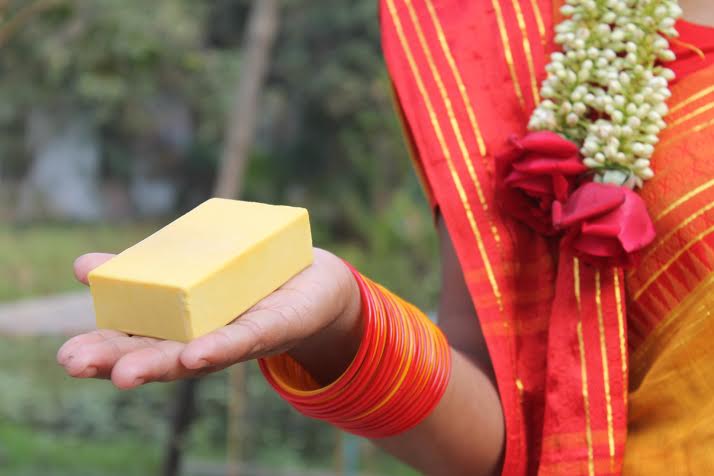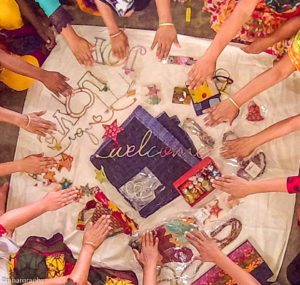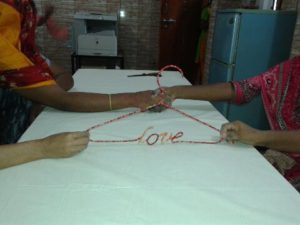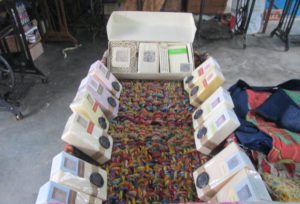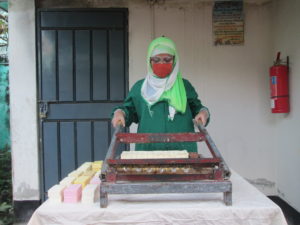Guest blogger Ishrat Jahan Deepa, Unit Manager – Sacred Mark Enterprise
Established in March 2009, by the Mennonite Central Committee in Bangladesh (MCCB)
Sacred Mark Enterprise provides alternative employment for former sex workers.
The stories of these women involve abuse, victimization, trauma, and pain. A widow, an orphan, a rape victim, a mother with no food for her children. These vulnerabilities had forced them into a life we shudder to imagine. Initially, twenty-six women were selected to enter a training program which would give them respect, pride and legitimacy within society. The program, called Pobitra (a feminine version of the Bengali word for “Holy”), is administered by the Health, Education and Social Services (HESS) program of MCCB. The ladies began this journey with a “New Life” celebration where all twenty-six eagerly committed themselves to leave the past and embark on a new path. They received training, counseling and support to equip them to re-enter a normal work life, particularly with Sacred Mark, producing natural soaps and other products.
The transformation has been visible and we are amazed as we watch them soften and change. We refer to them as “survivors,” because we have watched these women rise above the suffering of their past lives and enter their new lives with a courage and tenacity that is inspiring.
The name “Sacred Mark” speaks to the transformation as portrayed so powerfully in a poem by Rabindranath Tagore: “Rub out, wipe out, the writing of disgrace from my forehead” and replace it with “the sacred mark…” The poem Gitali 34, expresses the pain of disgrace, the raging storm of cleansing and the plea for new life, “…fill my life to the core.”
Let me, O let me
hold to my head a fallen petal
from your garland
Into that lake of delight
that knows no depths
let me sink, O let me die
O rub out, wipe out
the writing of disgrace from my forehead.
Today, O Friend,
let me wear, O let me wear secretly
on my forehead the sacred mark
impressed by Your own hand,
Let Your storm rage in my flower garden,
Let the dry leaves, the withered flowers
fall to the ground.
Whatever there is of my life
that lies scattered on the path–
let it all be removed, O let it be removed.
There are vast riches
in Your grand-treasury–
I wander about
filling my hands with what I pick up,
but my heart is not filled this way;
O let me fill my life to the core!
At the moment we have 27 producers who have left their prostitution life and another six who come from equally dire situations. Some producers have no earning member in their families while others are widows with two or three children. These six are involved with us as product development trainers. In addition to this, we take on home based producers whenever we get large orders and need the extra help. At the moment we have 15 such home based producers.
Our producers come from Pobitra – a training program of MCCB and are aged between 18-35 and are all permanent residents working in Mymensingh (the city where Sacred Mark Enterprise is located). This training center only provides training to the sex- workers, those who willingly want to leave the sex trade and to return to a normal life. Pobitra doesn’t force women to stop sex trade. But if anyone wants to stop sex trade willingly and wants to do an alternative job, only she is welcomed to Pobitra.
Most of the ladies live with their children and husbands, though initially their husbands were not their legal husband’s. They called them Babu referring not a husband, but a regular sex partner. A Babu also used to help her find the customers & get maximum income of her in his pocket. They would have children, but those children would have no right in their father’s property. Upon joining Sacred Mark, we arranged marriage registration with their respective Babus with whom they now live. Their children also have rights to receive their father’s property. As these children were not recognized as legitimate, they were not allowed admittance into schools, forcing them to work as household maids, even though child labor is completely prohibited in Bangladesh. Family members did not prefer to give them any recognition nor did neighbors want to host them at their house. They had no right to attend any social activities and were treated as street children from an early age.
Our producer’s children now all study at schools and some have gone to to college. Our producers are now participating members of their communities and one of our producers has been elected secretary in her neighourhood. All maintain a savings fund on their own. Their husbands have started working in hotels and restaurants while some pull rickshaws or work as day-labourers. Their monthly family income is increasing day by day. We can see them being thoughtful about their baby girls’ safety and protecting them from the choices they have made in the past.
Sacred Mark Enterprises currently has two main products line. One is Natural Handmade soap and the other is recycled sari products.
Sacred Mark’s Soap: These luxurious soaps are handmade out of natural ingredients and colorants. The primary oils used are coconut and palm oil. Coconut oil is best known for its lathering and moisturizing properties without leaving the skin feeling greasy. Palm oil pairs well with coconut oil, helping to create a stable, long-lasting bar of soap. Most of Sacred Mark’s soaps are mildly scented with essential oils but we also offer an unscented variety. Exfoliating soaps contain naturally-occurring exfoliates. A cold-process is used to create these wholesome soaps in small batches to ensure the best of quality. After the soap is made, it is cut and trimmed by hand.
Our main ingredients include Coconut oil, Palm oil, Sunflower oil, Corn oil, Castor oil, Soybean oil and many more. All the oils are available in Bangladesh locally. We purchase them from the wholesalers. All fragrances are imported from France, Germany and they are certified by IFRA (The International Fragrance Association (IFRA). Essential oils are locally produced by a company called DJ Agro Limited and we buy from them. This company also supply us oils produced from lemongrass & eucalyptus.
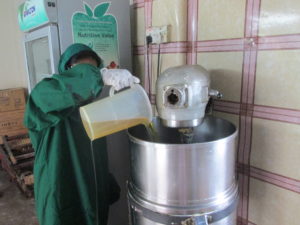
Sacred Mark Sari products: When we started soap project we did not have enough orders for our producers even though we had production capacity. To make natural handmade soap, curing is required as one of the important steps. This curing process takes two to three weeks’ time. We keep it in 21 days for curing process. During this time our producers used to pass their time idle. As they had no work, they used to keep them busy in either gossiping or quarreling with each other or even sometimes they were found to be doing some other nonprofessional activities at the work. We tried to give them several awareness training activities, but they could not create a peaceful environment in the workplace for such activities too. Finally the management team decided to introduce us with a new product line from recycle sari. It was 2010, we developed throws and bookmarks from recycled sari material. Our producers liked to make these items too. We were able to have a peaceful environment at our workplace by ensuring their work. Finally, when producers were able to receive good wages they became happy. The Throw is a traditional and familiar product here in Bangladesh and is easy to sew, so the producers were happy to make them. Day by day we developed many other items out of these same materials, such as cloth books, duvet covers, necklaces, Christmas ornaments, cushion covers, bags, earrings and buntings.
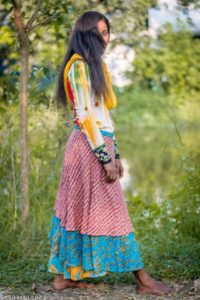
We develop our product designs in 3 ways: developing products on our own; using designs from our parent company, Prokritee’s trained expert designers and; using designs that come directly from our buyers.
Every 3 months we ask some of our artisans to make one new product from their own ideas. This way we get at least 10 products in every 3 months. We Then select five products which we work on and pass on to the expert designers at Prokritee for further modification. In addition to this, the Prokritee design team provides some new designs on the basis of seasonal trends, colors, etc.,quarterly.
We always prioritize our product design and development. We ensure to produce best quality raw materials, appropriate color, size, and the compliances. It is very important to have quality raw materials supplied by the suppliers for soap making. So, we always consider the quality of our raw materials as well as the capability of the suppliers to supply us such materials. If any of the suppliers fails to do so, we discontinue buying from them.Sacred Mark Enterprise never compromises when it is about the quality issue of the raw materials.
We have both local and export markets to whom we supply our products and we have a retail and wholesale shop through which we sell to our local customers. Our primary export customers include, Ten Thousand Villages USA; Ten thousand villages Canada; Trades of Hope; Charity USA.com; Hope International; Serrv International; Eza Australia; Sihumcraft Link; Shapla Neer Japan; U- Lands Denmark; Free Set UK; Fair Trade Korea; Fair Trade Hong Kong; Oxfam Australia; Oxfam Spain and; Artisan Sel. Locally, our primary target customers are foreigner living in Bangladesh. We also participate in craft bazaars and exhibitions. In addition to this we also sell our in some handicraft stores in the capital city, as well as eco-friendly resorts and some business who uses our products as corporate gifts.
Sacred Mark Enterprise is a WFTO guaranteed fair trade organization. Our all export buyers are fair trade organizations and our local customers also believe in the principals of fair trade.
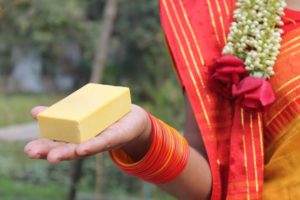
In future I would love to see Sacred Mark Enterprise increase our number of producers; increase our sales by 20% higher than last year; increase the wages of the producers and staff by 6%; develop 30 new designs; increase local sales; increase buyers; participate in trade shows and fair trade activities; distribute school kits from our community development fund and; provide our producers with a holistic life through Sacred Mark Enterprise activities.
For more information about Sacred Mark Enterprise visit: http://www.prokritee.com/#!sacred-mark-enterprise/c7mj

